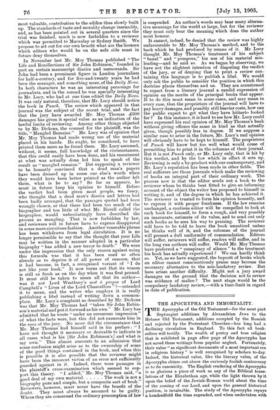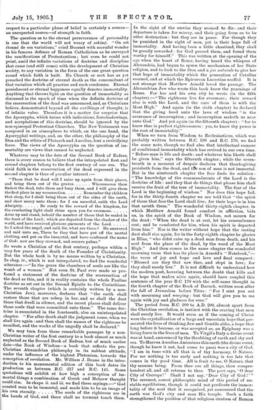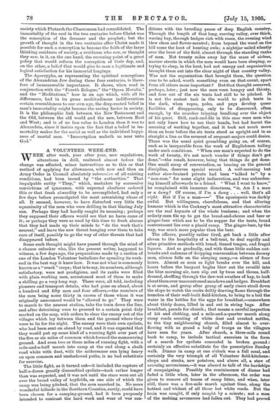T HE Apocrypha of the Old Testament — for the most part Septuagint
additions by Alexandrian Jews to the Hebrew Old Testament, additions accepted by the Romish and rejected by the Protestant Churches—has long had a declining circulation in England. To this fact all book- sellers will testify. The wealth of poetry and true religion that is exhibited in page after page of the Apocrypha has not saved these writings from popular neglect. Fortunately, their value "as significant documents of a most important era in religions history" is well recognised by scholars to-day. Indeed, the historical value, like the literary value, of the Apocrypha shines out above the curiously foolish controversy as to its canonicity. The English rendering of the Apocrypha is as glorious a piece of work as any of the Biblical trans- lations of the Elizabethan age, while the light thrown by it upon the belief of the Jewish-Roman world about the time of the coming of our Lord, and upon the general historical position, is invaluable. The study of the Apocrypha repays a hundredfold the time expended, and when undertaken with
The question as to the eternal perseverance of personality is one that the world will not weary of asking. "On eat etonne de ces variations," cried Bossuet with scornful wonder in his famous defence of Roman Catholicism as he surveyed the ramifications of Protestantism ; but even he could not point, amid the infinite variations of doctrine and discipline that came (and still come) with the development of Christian society, to any variation in the form of the one great question round which faith is built. No Church or sect has as yet preached the doctrine of eternal death as the concomitant of that variation which all practise and each condemns. Eternal punishment or eternal happiness equally denotes immortality. Anything that throws light on the question of immortality as discussed in the epoch of time when the definite doctrine of the resurrection of the dead was announced, and, as Christians believe, demonstrated beyond all the cavillings of thought, is of infinite value. Therefore it is a matter for surprise that the Apocrypha, which teems with indications, foreshadowings, and acceptations of this doctrine, should be ignored by the non-episcopal Protestant Churches. The New Testament was composed in an atmosphere to which, on the one hand, the Apocryphal writings, and, on the other, the philosophy of the Stoa and the ethics of Plutarch and Aurelius, lent a revivifying force. The views of the Apocrypha on the question of im- mortality are views that cannot be neglected.
Whatever may be the date of the Second Book of Esdras, there is every reason to believe that the interpolated first and second chapters belong to the first century of our era. The vivid faith in the resurrection of the dead expressed in the second chapter is thus of peculiar interest :—
" Those that be dead will I raise up again from their places,
and bring them out of the graves Wheresoever thou findest the dead, take them and bury them, and I will give them the first place in my resurrection Remember thy children that sleep, for I shall bring them out of the sides of the earth, and show mercy unto them : for I am merciful, saith the Lord Almighty Be ready to the reward of the kingdom, for the everlasting light shall shine upon you for evermore Arise up and stand, behold the number of those that be sealed in the feast of the Lord ; which are departed from the shadow of the world, and have received glorious garments of the Lord So I asked the angel, and said, Sir, what are these ? He answered and said unto me, These be they that have put off the mortal clothing, and put on the immortal, and have confessed the name of God: now are they crowned, and receive palms."
So wrote a Christian of the first century, perhaps within a very few years of the death of the Founder of Christianity. But the whole book is by no means written by a Christian. In chap. iv., which is not interpolated, we find the wonderful utterance :—" In the grave the chambers of souls are like the womb of a woman." Not even St. Paul ever made so pro- found a statement of the doctrine of the resurrection of the dead as this, and it in reality contains the whole Pauline doctrine as set out in the Second Epistle to the Corinthians. The seventh chapter (which is certainly written by a non- Christian Jew), moreover, declares that "the earth shall restore those that are asleep in her, and so shall the dust those that dwell in silence, and the secret places shall deliver those souls that were committed unto them." The same doc- trine is enunciated in the fourteenth, also an uninterpolated chapter. "For after death shall the judgment come, when we shall live again : and then shall the names of the righteous be manifest, and the works of the ungodly shall be declared."
We may turn from these remarkable passages by a non- Christian writer of the first century to a book almost as much neglected as the Second Book of Esdras, but of much earlier date—the Book of Wisdom—a book that reflects the pre- Christian Alexandrian philosophy in its noblest attitude, under the , influence of the highest Platonism, towards the conception of revelation. Mr. William J. Deane in the intro- duction to his monumental edition of this book dates its production as between B.C. 217 and B.C. 145. Some quotations will exhibit at how high a conception of im- mortal things a combination of Greek and Hebrew thought could aim.. In chaps. ii. and iii. we find these sayings :—" God .created man to be immortal, and made him to be an image of
Ins own eternity The souls of the righteous are in the bands of God, and there shall no torment touch them. In the sight of the unwise they seemed to die : and their departure is taken for misery, and their going from us to be utter destruction : but they are in peace. For though they be punished in the sight of men, yet is their hope full of immortality. And having been a little chastised, they shall be greatly rewarded : for God proved them, and found them worthy for himself." This was written at the opening of the age when the heart of Rome, having heard the whispers of Alexandria, had begun to spurn the mechanism of her State religion, and to look to the Stoa and a jus naturals to give her that hope of immortality which the generation of Catullus scorned, and at which the Epicurean Lucretius scoffed. It is not strange that Matthew Arnold loved the passage. The Alexandrian Jew who wrote this book knew the yearnings of Rome. For her and his own city be wrote (in the fifth chapter) :—" The righteous live for evermore ; their reward also is with the Lord, and the care of them is with the Most High." And again (in the sixth chapter) he declared that the giving heed unto the laws of wisdom "is the assurance of incorruption ; and incorruption maketh us near unto God." And yet again (in the fifteenth chapter) : "for to know thee is perfect righteousness : yea, to know thy power is the root of immortality."
When we turn from Wisdom to Ecclesiasticus, which was probably written between B.C. 190 and B.C. 170, we find the same note, though we find also that intellectual rumour of conditional immortality which has revived in our own time. "Before man is life and death : and whatever him liketh shall be given him," says the fifteenth chapter; while the seven- teenth in a moment of despair declares that thanksgiving, perisheth from the dead, and tlle son of man is not immortal.. But in the nineteenth chapter the fear finds its solution : "The knowledge of the commandments of the Lord is the, doctrine of life : and they that do things that please him shall receive the fruit of the tree of immortality. The fear of the Lord is the beginning of wisdom." Nor does this hope fail, for in the thirty-fourth chapter we are told that "the spirit of those that fear the Lord shall live ; for their hope is in him that saveth them." The wonderful thirty-eighth chapter, in which Matthew Arnold found comfort in affliction, bids us, in the spirit of the Book of Wisdom, not mourn for the dead : "When the dead is at rest, let his remembrance rest; and be comforted for him, when his spirit is departed from him." Nor is the writer without hope that the resting dust shall rise again, for in the forty-eighth chapter he glories in Elias, "who didst raise up a dead man from death, and his soul from the place of the dead, by the word of the Most High." And then comes in the same chapter the wonderful crowning verse that has its place in Arnold's " Notebook,"— the verse of joy and hope and love and final conquest : "Blessed are they that saw thee, and slept in love ; for they shall surely live." It is not difficult to understand bow the modern poet, hovering between the doubt that kills and, the hope that makes alive again, should have coupled this sentence of the year B.C. 170 with the self-same thought in the fourth chapter of the Book of Baruch, written soon after the fall of Jerusalem before Titus : "For I sent you out with mourning and weeping : but God will give you to me again with joy and gladness for ever."
The period from B.C. 200 to A.D. 200, almost apart from the Christian revelation, is instinct with the craving that men shall surely live. It would seem as if the coming of Christ were the crystallisation of a large and uncertain hope that per- meated the lives of thinking Jew and Gentile alike, a hope that long before it became, or was accepted as, an Epiphany was a living force in the lives of men. To Virgil's Italy a divine event was at band, announced by the throbbing of earth and sky and sea. To Marcus Aurelius Antoninus this earth (the divine event, though he knew it not. had come to pass) was a city of God. "I am in tune with all that is of thy harmony, 0 Nature. For me nothing is too early and nothing is too late that comes in thy good time. All is fruit to me, 0 Nature, that thy seasons bring. From thee are all things, thou compre- hendest all, and all returns to thee. The poet says, '0 dear City of Cecrops !' Shall I not say, Dear City of God !' " The serenest, sanest philosophic mind of this period of un- stable equilibrium, though it could not predicate the immor- tality of the soul that it recognised, yet announced that the earth was God's city and man His temple. Such a faith strengthened the position of that religious stratum of Roman
society which Plutarch the Chaeronean had consolidated. The immortality of the soul in the two centuries before Christ was the conception of the dreamer and the prophet ; but the growth of thought in the two centuries after Christ made it possible for such a conception to become the faith of the large thinking residuum of society, a residuum who saw, or thought they saw, in it, on the one hand, the crowning point of a great policy that would reform the corruption of their day, and, on the other, a belief that would give to man a legitimate and logical satisfaction for his immortal longings.
The Apocrypha, as representing the spiritual conceptions of the Alexandrian Jew during these four centuries, is there- fore of immeasurable importance. It shows, when read in conjunction with the "Fourth Eclogue," the "Opera Moralia„" and the "Meditations," how in an age which, with all its differences, had in its gross multitudinous indifferentism certain resemblances to our own age, the deep-rooted belief in man's immortality might become the saving factor in society. It is the philosophic link between the New Testament and the Old, between the old world and the new, between East and West; and is of no less value to London than it was to Alexandria, since it insists upon the fact that a belief in im- mortality makes for the social as well as the individual happi- ness of mortal men. " Incorruption maketh us near unto God."
A VOLUNTEER WEEK-END.








































 Previous page
Previous page